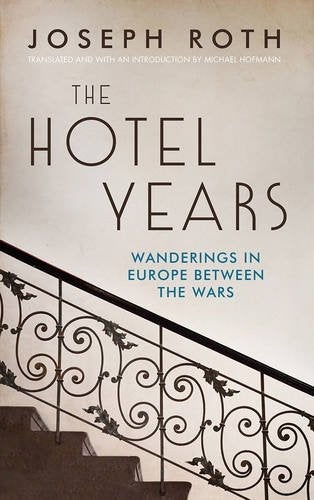The Hotel Years, by Joseph Roth - book review: Cameos in a lost continent
(Translated by Michael Hofmann) Granta - £16.99

Your support helps us to tell the story
From reproductive rights to climate change to Big Tech, The Independent is on the ground when the story is developing. Whether it's investigating the financials of Elon Musk's pro-Trump PAC or producing our latest documentary, 'The A Word', which shines a light on the American women fighting for reproductive rights, we know how important it is to parse out the facts from the messaging.
At such a critical moment in US history, we need reporters on the ground. Your donation allows us to keep sending journalists to speak to both sides of the story.
The Independent is trusted by Americans across the entire political spectrum. And unlike many other quality news outlets, we choose not to lock Americans out of our reporting and analysis with paywalls. We believe quality journalism should be available to everyone, paid for by those who can afford it.
Your support makes all the difference.Joseph Roth is best known for his novel The Radetzky March, about the decline and fall of the Austro-Hungarian Empire. Born into a Jewish family in Galicia in 1894, he worked as a journalist for the Frankfurter Zeitung, among other newspapers, travelling across Europe until the rise of fascism forced him to leave Germany.
This collection of his journalism, 64 feuilletons, mostly set in Europe between the world wars, creates a vivid sense of a continent on the brink of change. Roth’s translator, Michael Hofmann, has grouped his work by country, including Albania, Austria and the USSR; and by theme, including “hotels” and the vicarious “pleasure and pains” of Roth’s itinerant existence.
Roth’s acute observations on Albania could describe any dictatorship today. Of “urban Albanians”, he writes: “They seem to have given up all their own opinions, and only listen to those of others .… In place of political convictions there is political partisanship, instead of struggle conspiracy, instead of a word a hint, instead of caution fear. In this land no ruler is safe, and no subject either.”
Roth spent so much time living in hotels that he declared himself “a hotel citizen, a hotel patriot”. Highlights include his portraits of the staff of an unnamed European hotel in 1929, transporting the reader to a now vanished world. The chief receptionist has a “gift of switching almost instantaneously between fury and graciousness, indifference and curiosity, aloofness and anxiety to be of service”. By contrast, the ancient waiter “is well on his way to petrification … He walks from the knees down, his feet take tiny shuffling steps. If someone is in his way, he will stop, a mechanism stalls, and you think you hear somewhere under the tails that a little cog has suddenly ground to a halt. Then he starts to move again. A quarter of an hour later, the old man reaches the restaurant.”
In 1934, Roth wrote: “A country where bad things happen and more bad things are prepared than in any Hell’s kitchen no longer deserves to be called a fatherland.” The collection’s final piece, published in 1931, where Roth describes losing his cradle aged around three, serves as a prescient summary of the loss of a homeland: “I am left feeling sad, inconsolably helpless and sad. I seem to understand that I have lost something irrevocable. I have been in a certain sense robbed.” He severed all ties with Germany in 1933 and died in exile six years later.
Join our commenting forum
Join thought-provoking conversations, follow other Independent readers and see their replies
Comments